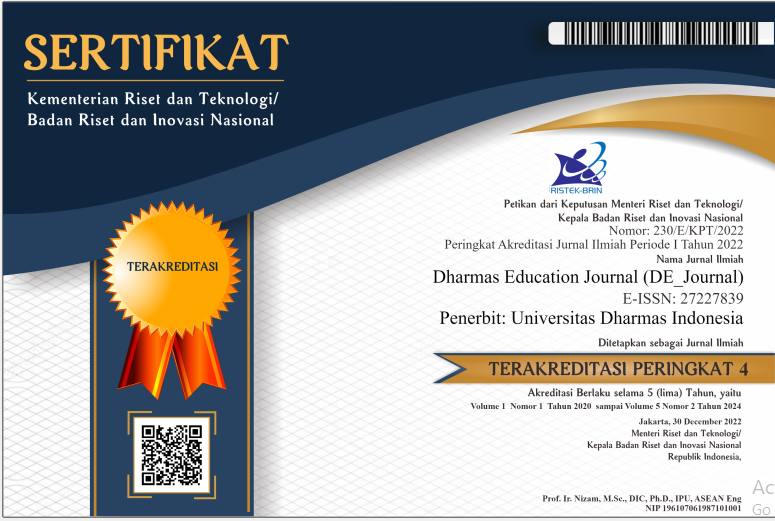The Effectiveness of “Two Truths and A Lie” Game in Improving Self Awareness
DOI:
https://doi.org/10.56667/dejournal.v6i1.1661Keywords:
Games, Self-Awareness, Two Truths and A Lie.Abstract
The purpose of this study was to determine the effectiveness of the game “two truths and a lie” in increasing self-awareness. Self-awareness is a person's ability to understand oneself deeply, both in terms of emotions, thoughts, and actions. The Two Truths and a Lie game is a social game that is often used for introductions or building intimacy in groups. In this game, each participant takes turns delivering three statements about themselves. Two of the statements must be true (truth) and one statement must be false (lie). The other participants have to guess which statement is a lie. By using “Two Truths and a Lie,” students can get to know each other better, which is an important first step in the guidance and counseling process. This study uses an experimental research method, which aims to determine the effectiveness of the Two Truths and a Lie game treatment on students' Self-awareness. In this study, the design used is One Group Pretest-Posttest Design, where the results of children's abilities are measured before and after being given treatment. The results showed that there was a significant increase in students' Self-awareness after being given the Two Truths and a Lie game. Statistical testing using the Wilcoxon test indicated an increase in students' Self-awareness. On positive ranks in the test, 12 students showed an increase in Self-awareness from pretest to posttest. In addition, there was no decrease in students' Self-awareness.
Downloads
References
Agniarahmah, A., Yulia, C., & Stevani, H. (2023). KEEFEKTIFAN MEDIA ULAR TANGGA DALAM MENINGKATKAN SELF AWARENESS. Jurnal Bimbingan Konseling Indonesia, 8(1), 8–13.
Carden, J., Jones, R. J., & Passmore, J. (2022). Defining Self-Awareness in the Context of Adult Development: A Systematic Literature Review. Journal of Management Education, 46(1), 140–177. https://doi.org/10.1177/1052562921990065
Dharmapatni, N. W. K., Adnyana, I. K. B., Strisanti, I. A. S., Harditya, I. K. B., Damayanti, I. A. M., & Wulansari, N. T. (2024). ANALISIS FAKTOR YANG MEMPENGARUHI SELF AWARENESS MASYARAKAT TERHADAP FAKTOR RISIKO PENYAKIT GINJAL KRONIK (PGK) DI BALI. Journal of TSCNers, 9(1), 2503–2453. http://ejournal.annurpurwodadi.ac.id/index.php/TSCNers
Eife, G., Mansager, E., & Witte, K. H. (2021). Adlerian Depth Psychotherapy: Intersubjective and Relational Elements. The Journal of Individual Psychology, 77(3), 286–304. https://doi.org/10.1353/jip.2021.0021
Hamzanwadi. (2021). Efektifitas Layanan Bimbingan dan Konseling di SLBN Pembina Kota. AL-IRSYAD: Jurnal Bimbingan Konseling Islam, 3(2), 267–282. http://jurnal.iain-padangsidimpuan.ac.id/index.php/Irsyad
Iqbal, M., Margolang, A. I., Alamsyahdana, A., Nst, R. M. S., & Pras, J. (2024). Implementasi Program Evaluasi Pendidikan (Bimbingan Konseling) di Sekolah Dasar. Socius: Jurnal Penelitian Ilmu-Ilmu Sosial, 1(12), 299–305. https://doi.org/10.5281/zenodo.12738754
Ivanka, D., & Dinata Saragi, M. P. (2023). Overthinking Pada Mahasiswa: Analisis Perbandingan Mahasiswa Tingkat Awal dan Tingkat Akhir. GUIDENA: Jurnal Ilmu Pendidikan, Psikologi, Bimbingan Dan Konseling, 13(2), 225. https://doi.org/10.24127/gdn.v13i2.7455
Kusyairi, A., & Addiarto, W. (2019). ANALISIS FAKTOR YANG MEMPENGARUHI SELF AWARENESS MASYARAKAT DALAM MELAKUKAN MITIGASI BENCANA DI AREA RAWAN BENCANA GUNUNG BROMO DESA NGADISARI, KECAMATAN SUKAPURA-PROBOLINGGO. Jurnal Ilmu Kesehatan, 2(2), 42–47.
Magdalena, I., Annisa, M. N., Ragin, G., & Ishaq, A. R. (2021). ANALISIS PENGGUNAAN TEKNIK PRE-TEST DAN POST-TEST PADA MATA PELAJARAN MATEMATIKA DALAM KEBERHASILAN EVALUASI PEMBELAJARAN DI SDN BOJONG 04. Jurnal Pendidikan Dan Ilmu Sosial, 3(2), 150–165. https://ejournal.stitpn.ac.id/index.php/nusantara
Mardian, S., Syamsir, Vanessa, E. R., Putri, U. S., & Nufus, G. N. (2024). PERAN BUDAYA DALAM MEMBENTUK NORMA DAN NILAI SOSIAL : SEBUAH TINJAUAN TERHADAP HUBUNGAN SOSIAL DAN BUDAYA. Triwikrama: Jurnal Ilmu Sosial, 3(11).
Murni, S. N., Bancin, W., & Azizah, F. N. (2024). Peran Bimbingan Konseling Terhadap Perkembangan Emosional Siswa. Jurnal Arjuna : Publikasi Ilmu Pendidikan, Bahasa Dan Matematika, 2(4), 161–169. https://doi.org/10.61132/arjuna.v2i4.1101
Napitupulu, A. P., Armyliyanda, N., & Hardiansyah, R. (2022). PERAN LINGKUNGAN MASYARAKAT DALAM MENGATASI KONFLIK SOSIAL TERHADAP PERKEMBANGAN MORAL ANAK. Journal of Science and Social Research, 5(3), 568–580. http://jurnal.goretanpena.com/index.php/JSSR
Putri, D. F., Budim Setia, Iswari, M., Zulmiyetri, & Arnez, G. (2024). Meningkatkan Media Pancingan Huruf Untuk Meningkatkan Pengenalan Huruf Konsonan Pada Anak Tunagrahita Ringan. Jurnal Pendidikan, 33(3), 659–668. https://doi.org/10.32585/jp.v33i3.5498
Rustamana, A., Firman, M. A., Arifin, Tb. R. Z., & Suryaningrat. (2024). METODE EKSPERIMEN. Sindoro CENDIKIA PENDIDIKAN, 5(6), 1–10. https://doi.org/10.9644/sindoro.v4i5.3317
Situmeang, E. S. (2024). Peran Pendidikan Agama Islam dalam Membentuk Kesehatan Mental Siswa. PEDAGOGIK Jurnal Pendidikan Dan Riset, 2(3), 393–400.
Downloads
Published
How to Cite
Issue
Section
License
Copyright (c) 2025 Dharmas Education Journal (DE_Journal)

This work is licensed under a Creative Commons Attribution-NonCommercial-NoDerivatives 4.0 International License.
Makalah yang disampaikan diasumsikan tidak mengandung bahan propietary yang tidak dilindungi oleh hak paten















